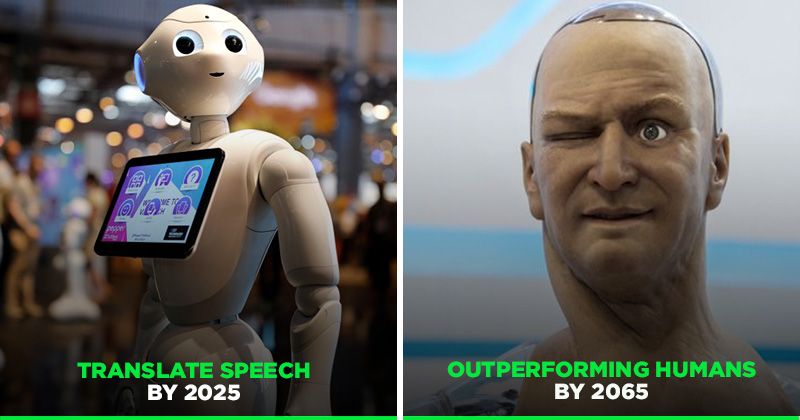Right now, almost every major tech company is working on an artificial intelligence system, as are plenty of independent research groups. The technology is already beginning to transform our everyday life, and it’ll change what kind of jobs will even be available to us in the future.

With applications in transportation, health, science, finance, and the military, AI will eventually reshape industries, getting rid of many jobs in the process. A group of researchers from the Future of Humanity Institute at Oxford University, the Department of Political Science at Yale University, and the AI Impacts group, have now come together to compile a study of how AI will take over human jobs and by when. Here are some of the highlights.
Quit playing games
In the next five to six years, experts believe artificial intelligence systems will be able to smartly play a number of games, starting from the simpler like Angry Birds, to complex strategy games like Starcraft. Not just play them either, but to the extent they’d be able to even beat humans at it.

Transcribing and translation
Within the next six years, it’s expected that AI will be able to outperform the average human at transcribing speech. On top of that, they expect real-time translations to take just a couple of years longer than that for AI to master.
The charts and the streets
Oddly enough, there are two widely different capabilities experts believe AI to gain at around the same time, just 11 to 12 years from now. In that time, they believe machine learning systems will be able to autonomously drive a truck between destinations, and also somehow write a pop song that makes it to the top 40 list. The only difference is that truck-driving AIs won’t have dreams of becoming a singer.

Use your words
It’s after that that AI is supposed to really take off, taking on more professions that involve more communication. In 15 years, they believe a robot will probably be the salesperson greeting you in a store, and helping you find what you’re looking for. That’s an impressive feat in itself considering it would have to make realistic conversation with a human to work. Even more so than that is the next entry, which entails that AI will be able to write a New York Times best-selling novel, within just about 35 years!
Genius AI takes over
Between 35 to 37 years from now, sometime after writing that book, experts believe AI will have progressed to understanding and solving high math problems. Indeed, they expect algorithms to be able to take on the Putnam Math competition, arguably the most prestigious of its kind in the world, and be able to beat the human participants. In addition, about 40 to 45 years from now, AI will have gotten even smarter and progressed to actually conducting its own Math research like nothing we’ve ever seen before.

Is there a doctor in the house?
Right now, AI is already being developed to detect and analyse patient symptoms to aid in a doctor’s diagnosis. In the next 37 years, it’s possible computers will have gotten so good at understanding the human body, they’ll actually be routinely carrying out surgeries in hospitals using automated implements. There’s no telling if it’ll have any decent bedside manner though.
Self advancement
By the time about 85 to 90 years have passed, the same AI researchers weighing in today may not even be necessary. They believe that machine learning systems will be able to build other efficient AI better and faster than humans. That’s probably about the time we need to ensure we have strict regulations in place to keep the power balance in our favour.

Full automation of labour
Eventually, the expectation is that AI will automate pretty much every job humans do today. Researchers believe there is a 50 percent chance of AI outperforming humans in all tasks in 45 years and of automating all human jobs in 120 years. At that point, who can even imagine what we’d be doing with our time if no one needs to ever work or do chores. Will we just become lazy blobs like the space-habiting humans in Pixar’s Wall-E? Perhaps, but here’s to hoping we’ve figured out that problem before we get there.

